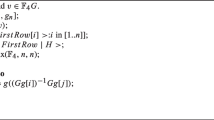Abstract
The Gleason–Pierce–Ward theorem gives constraints on the divisor and field size of a linear divisible code over a finite field whose dimension is half of the code length. This result is a departure point for the study of self-dual codes. In recent years, additive codes have been studied intensively because of their use in additive quantum codes. In this work, we generalize the Gleason–Pierce–Ward theorem on linear codes over GF(q), q = p m, to additive codes over GF(q). The first step of our proof is an application of a generalized upper bound on the dimension of a divisible code determined by its weight spectrum. The bound is proved by Ward for linear codes over GF(q), and is generalized by Liu to any code as long as the MacWilliams identities are satisfied. The trace map and an analogous homomorphism \({x\mapsto x-x^p}\) on GF(q) are used to complete our proof.
Similar content being viewed by others
References
Betsumiya K., Harada M.: Optimal self-dual codes over \({\mathbb{F}_2\times\mathbb{F}_2}\) with respect to the Hamming weight. IEEE Trans. Inf. Theory 50, 356–358 (2004)
Bouyuklieva S.: On the minumum weights of type IV codes over \({\mathbb{Z}_4}\) with certain lengths. In: International Workshop on Coding and Cryptography (Paris 2001). Electronic Notes in Discrete Mathematics, vol. 6, 7 pp. (electronic). Elsevier, Amsterdam (2001).
Bouyuklieva S.: Some results on type IV codes over \({\mathbb{Z}_4}\). IEEE Trans. Inf. Theory 48, 768–773 (2002)
Bouyuklieva S., Harada M.: On type IV self-dual codes over \({\mathbb{Z}_4}\). Discrete Math. 247, 25–50 (2002)
Calderbank A.R., Rains E.M., Shor P.W., Sloane N.J.A.: Quantum error-correction via codes over GF(4). IEEE Trans. Inf. Theory 44, 1369–1387 (1998)
Delsarte P.: Bounds for unrestricted codes by linear programming. Philips J. Res. 27, 272–289 (1972)
Dougherty S.T., Gaborit P., Harada M., Munemasa A., Solé P.: Type IV self-dual codes over rings. IEEE Trans. Inf. Theory 45, 2345–2360 (1999)
Dougherty S.T., Gulliver A.T., Oura M.: Higher weights for ternary and quaternary self-dual codes. Des. Codes Cryptogr. 38, 97–112 (2006)
Gulliver A.T., Harada M.: Construction of optimal type IV self-dual codes over \({\mathbb{F}_2+u\mathbb{F}_2}\). IEEE Trans. Inf. Theory 45, 2520–2521 (1999)
Harada M., Munemasa A.: Classification of type IV self-dual \({\mathbb{Z}_4}\)-codes of length 16. Finite Fields Appl. 6, 244–254 (2000)
Huffman W.C.: On the classification and enumeration of self-dual codes. Finite Fields Appl. 11, 451–490 (2005)
Huffman W.C., Pless V.S.: Fundamentals of error-correcting codes. Cambridge University Press, Cambridge (2003)
Kennedy G.: Weight distribution of linear codes and the Gleason–Pierce theorem. J. Comb. Theory Ser. A 67, 72–88 (1994)
Kennedy G.T., Pless V.: On designs and formally self-dual codes. Des. Codes Cryptogr. 4, 43–55 (1994)
Kim J.L., Pless V.: A note on formally self-dual even codes of length divisible by 8. Finite Fields Appl. 13, 224–229 (2007)
Liu X.: On divisible codes over finite fields. Ph.D. thesis, Caltech. http://resolver.caltech.edu/CaltechETD:etd-05252006-010331 (2006).
Liu X.: An equivalence of Ward’s bound and its application in nonlinear divisible codes. IEEE Trans. Inf. Theory (under review).
Rains E.M., Sloane N.J.A.: Self-dual codes. In: Pless, V.S., Huffman , W.C.(eds) Handbook of Coding Theory, pp. 177–294. Elsevier, Amsterdam (1998)
Sloane N.J.A.: Self-dual codes and lattices, in relations between combinatorics and other parts of mathematics. Proc. Symp. Pure Math. 34, 273–308 (1979)
Ward H.N.: Divisible codes. Arch. Math. 36, 485–499 (1981)
Ward H.N.: A bound for divisible codes. IEEE Trans. Inf. Theory 38, 191–194 (1992)
Ward H.N.: Quadratic residue codes and divisibility. In: Pless, V.S., Huffman, W.C.(eds) Handbook of Coding Theory, pp. 827–870. Elsevier, Amsterdam (1998)
Ward H.N.: The divisible code bound revisited. J. Comb. Theory Ser. A 94, 34–50 (2001)
Wilson R.M.: A lemma on polynomials modulo p m and applications to coding theory. Discrete Math. 306, 3154–3165 (2006)
Wood J.A.: Duality for modules over finite rings and applications to coding theory. Am. J. Math. 121, 555–575 (1999)
Author information
Authors and Affiliations
Corresponding author
Additional information
Communicated by R. Hill.
Rights and permissions
About this article
Cite this article
Kim, JL., Liu, X. A generalized Gleason–Pierce–Ward theorem. Des. Codes Cryptogr. 52, 363–380 (2009). https://doi.org/10.1007/s10623-009-9286-y
Received:
Revised:
Accepted:
Published:
Issue Date:
DOI: https://doi.org/10.1007/s10623-009-9286-y



